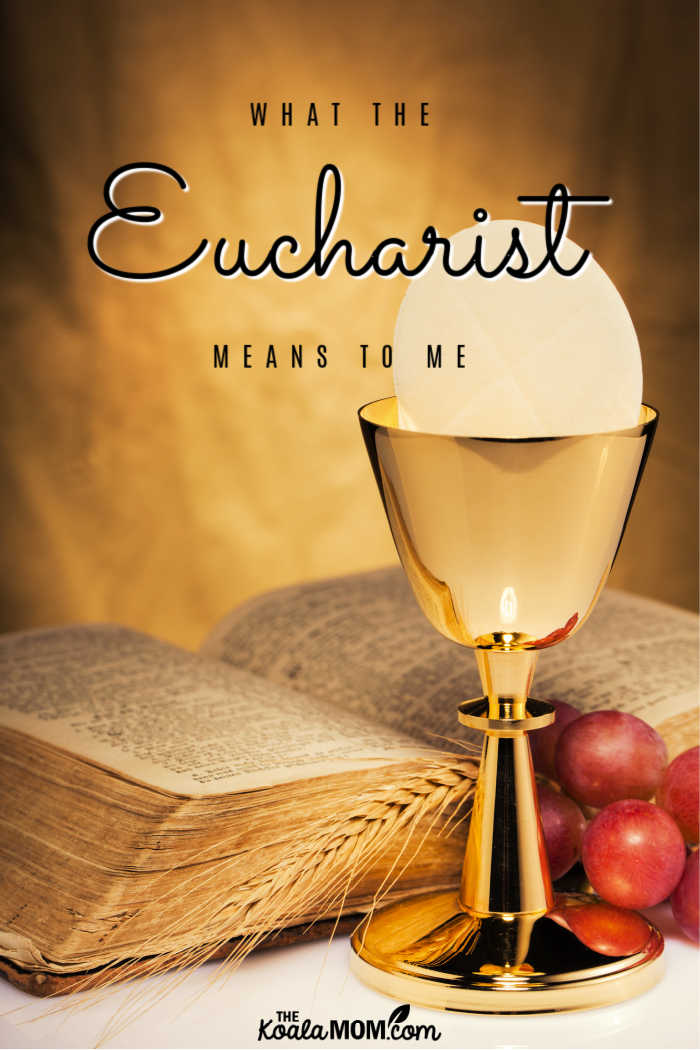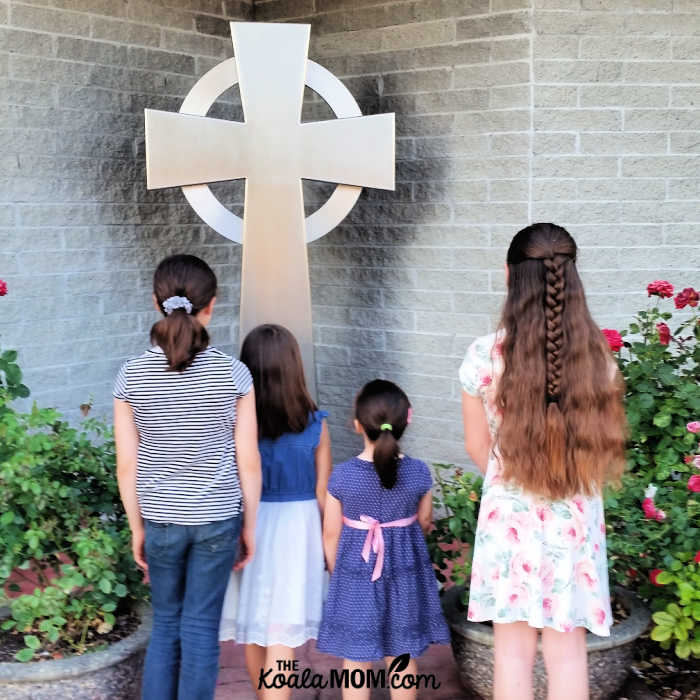I shared my conversion story a few years ago, how meeting my husband (also a Catholic convert) prompted my own journey from the Lutheran church to the Catholic. Lately, I’ve been thinking more about what exactly drew me into the Catholic faith, and the answer was clear. What drew me (and my husband as well) to the Catholic Church was the Eucharist.

This post contains affiliate links; as an Amazon associate, I earn from qualifying purchases.
His Conversion Story
My husband was the first Catholic convert I’d met. From the moment he said he was a convert, I was curious about how and why he had converted. That seemed like a personal question, however, so I didn’t ask it until three years later. Then, as we began seeing each other more and I knew our relationship was moving from friendship to something more serious, I knew I needed to know his story.
He gave me the short answer first. He’d gone to a Catholic youth conference with a friend of his. One the way home, that friend told him point-blank that either all Catholics were idolaters, or Jesus really was truly present, body and divinity, in the Eucharist. That set my husband on his journey into the Church. He said, “If that’s where Jesus is, then that’s where I want to be.”
My Journey into the Church
That little statement opened a door in my soul. I wanted to cry, “Yes! That’s where I want to be too!”
My faith had always been an important part of my life. I remember my baptism in the Lutheran church at age 8, and my confirmation in the same church at age 14. I took both events very seriously. I read my Bible cover to cover many times through my teens, and attended Bible studies and church conferences with my parents. I deliberately chose a Christian college to attend when I finish high school. I took both courses offered there on Martin Luther and the teachings of the Lutheran church, and was satisfied that I knew what Lutherans believed.
And yet… I wanted more.
“If that’s where Jesus is, then that’s where I want to be.” That pulled me. For almost two years, I went to Sunday Mass and frequently to daily Mass, with my boyfriend and then fiance, and even by myself, and walked up the aisle to receive only a blessing. I wanted the Eucharist. I wanted Jesus. And it was hard to sit there in the pew and not receive, yet I knew I had to really understand Church teachings before receiving, because this was Jesus. This was so important.
The first time my husband took me to adoration, I thought back to his friend’s words to him: either this is Jesus or this is idolatry. I knew what my mom would think of me sitting in front of a piece bread in a fancy gold display. But there in that quiet chapel, my knees aching from the hard stones, I looked up at the round white host in the shiny gold monstrance and I knew. That was Jesus. He was right there, with me.
That was a dozen years ago now. Of course, there are times when I take the Eucharist for granted, when I’m too busy in church chasing a two-year-old or shushing a four-year-old to really adore my Savior on the altar. There are time when I’m too focused on my own desires, my own hurts and unanswered prayers, to see Him waiting for me in the Host. And yet I also know He’s there, waiting, and that is why I meet Him every week at the very least.
Why Isn’t Grandma Going to Church?
Last fall, I drove to Alberta to see my mom for a few days before leaving the kids with her while I hiked the West Coast Trail. On Sunday morning, I piled my kids into the van for the five-minute drive to the Catholic Church where I’d been received into the faith. Mom mentioned she wasn’t going to church that morning and that she’d see us when we got back. As we pulled out of her driveway, one of the girls asked, “Why isn’t Grandma going to church?”
My mom still attends the Lutheran church I grew up in. The girls have gotten used to the fact that we go to a different church than their grandparents, and that doesn’t usually raise questions. They’ve seen my mom get ready for church and talk about the music and friends at church. But this Sunday, we were going to church and she wasn’t, and that was different.

I struggled with the words to explain why my mom didn’t make church the same priority as we did. I didn’t come up with the answer until halfway through Mass. Then, as we knelt to pray, I realized it came down to the Eucharist.
We go to Mass every Sunday (at the very least) to see Jesus, because we believe He is really and truly present there in the Eucharist, in a way that He isn’t present anywhere else. Yes, I can pray at home and in my van and gathered with two or three friends and Jesus lives in my heart. Yet He comes to us in a very special way, a very intimate and meaningful way, in the Eucharist. And the Lutheran church doesn’t believe or teach that.
My mom has no reason to go to church every Sunday. For her, church is about the prayers and the singing and the preaching and the friends. It’s nice if she can make it, and it’s not a big deal if she misses it because she’s canoeing or tired or out of town for a work conference. The Eucharist is not the pinnacle of the church service; in fact, when I was growing up, we only had communion once a month, because it was nice but not necessary.
The Eucharist is not a Symbol
 In the Catholic Church, the Eucharist is the source and summit of our faith. There are numerous Eucharistic miracles showing that the host truly does become Jesus the Lamb of God at the moment of consecration. Most of the saints made the Eucharist a high priority in their lives, going to daily Mass. In times of persecution, saints even died to protect the holy Eucharist from being mistreated or abused. To anyone else, it would seem strange that they’d be willing to die for a piece of bread, but they knew the Eucharist isn’t just a piece of bread; it is a piece of Jesus.
In the Catholic Church, the Eucharist is the source and summit of our faith. There are numerous Eucharistic miracles showing that the host truly does become Jesus the Lamb of God at the moment of consecration. Most of the saints made the Eucharist a high priority in their lives, going to daily Mass. In times of persecution, saints even died to protect the holy Eucharist from being mistreated or abused. To anyone else, it would seem strange that they’d be willing to die for a piece of bread, but they knew the Eucharist isn’t just a piece of bread; it is a piece of Jesus.
This August, a friend and I have been leading our younger daughters through the Cat Chat at-home VBS. The theme this year is the Eucharist, and so we’ve sung songs and memorized Bible verses about the Eucharist. One of the activities was to make fruit kebabs with the kids, and to explain, “We don’t see the vitamins and goodness inside the fruit we eat, but we know they are there to nourish our physical bodies. In a similar way, we are not able to ‘see’ Jesus in the Eucharist, but we have faith and believe He is there to feed our souls.”
I am grateful to my parents and the church I grew up in for the heritage of faith that they gave me. And yet I feel sad at times. Martin Luther wasn’t the first or only person to struggle with the idea that Jesus is present in the Eucharist. It’s mind boggling to think that as the priest prays, Jesus transforms the bread on the altar into Himself. Heresies arose in the early Church because people didn’t like that idea, and those heresies were proved wrong by early church fathers and theologians. And yet, in the 1500s, because of corruption and other issues in the Church, a Catholic priest was able to form his own church and to water-down the teaching on the Eucharist, and that opened the floodgates to allow other doubters to say the Eucharist is symbolic only.
There’s a famous quote about the Eucharist by Catholic author Flannery O’Connor, which Father Barron referenced in his Pivotal Players video about her. Flannery herself tells the story of this quote in one of her letters:
I was once, five or six years ago, taken by some friends to have dinner with Mary McCarthy and her husband, Mr. Broadwater. … She departed the Church at the age of 15 and is a Big Intellectual. We went at eight and at one, I hadn’t opened my mouth once, there being nothing for me in such company to say. … Having me there was like having a dog present who had been trained to say a few words but overcome with inadequacy had forgotten them.
Well, toward morning the conversation turned on the Eucharist, which I, being the Catholic, was obviously supposed to defend. Mrs. Broadwater said when she was a child and received the host, she thought of it as the Holy Ghost, He being the most portable person of the Trinity; now she thought of it as a symbol and implied that it was a pretty good one. I then said, in a very shaky voice, Well, if it’s a symbol, to hell with it.
That was all the defense I was capable of but I realize now that this is all I will ever be able to say about it, outside of a story, except that it is the center of existence for me; all the rest of life is expendable.
St. Kateri and the Eucharist
 When I was researching the life of St. Kateri Tekakwitha for my Canadian Saints Kids Activity Book, I came across a story of a time when she had to make spiritual communion. Because of her family’s persecution, she waited years to join the Church and receive the Eucharist. Then she traveled thousands of miles to the Catholic mission in Canada, where she was able to receive Jesus daily.
When I was researching the life of St. Kateri Tekakwitha for my Canadian Saints Kids Activity Book, I came across a story of a time when she had to make spiritual communion. Because of her family’s persecution, she waited years to join the Church and receive the Eucharist. Then she traveled thousands of miles to the Catholic mission in Canada, where she was able to receive Jesus daily.
However, it was tradition, among the Catholic First Nations who lived at the mission, to go out on a hunt every fall. In her first year at the mission, Kateri went with her sister and her family on the hunt. That meant leaving behind the mission, the priests, and the Eucharist. In their camp, Kateri set up a place where she could pray and make spiritual communion. The following year, she decided the Eucharist was more important to her than the annual hunt. While her family went out, she stayed at the mission. That meant getting less food and may have contributed to her early death, but to Kateri, spiritual food was more important than physical food.
It made me wonder what I would be willing to give up to receive the Eucharist. Here in Canada, we are blessed to have churches nearly everywhere. Before the pandemic, going to daily Mass was easy—I could choose between walking ten minutes to one church or driving five minutes to another church. And yet too often, I chose to stay at home, making laundry and housework and checking email more important than receiving my Lord.
Eucharist in the time of Pandemic
All of this has been on my heart recently because of the pandemic. Churches are closed. Masses have moved online. And many of us Catholics sit on our couches on Sunday morning, watching the priest raise the Eucharist, and making spiritual communion while dearly wishing to taste and touch our Saviour. And yet others have decided that at-home Mass is perfectly okay.
 On my Facebook page just after churches opened here in Canada, I asked if others had been able to attend Mass (or church) since the pandemic started. Someone replied that they now prefered TV Mass. I thought, with great sadness, that she was completely missing the point of the Mass. She did not understand the true presence of Jesus in the Eucharist.
On my Facebook page just after churches opened here in Canada, I asked if others had been able to attend Mass (or church) since the pandemic started. Someone replied that they now prefered TV Mass. I thought, with great sadness, that she was completely missing the point of the Mass. She did not understand the true presence of Jesus in the Eucharist.
The pandemic has, in many ways, challenged me to stop taking the Eucharist for granted. I’m now on the daily Mass schedule twice a week and most weeks, one of my daughters asks if she can come along with me to Mass (usually my 7-year-old). We’re only able to attend Mass on every second Sunday due to space limitations of our church, but those Sundays become more special as we are able to be there with our priest, with Jesus, with our Catholic family.
So today, consider that holding the Host in your hands is like Mary holding the infant Jesus in her arms. It’s like Mary bringing Jesus for the Presentation. Each of us is receiving the miracle of the feeding of the five thousand when we eat, and at the Last Supper. We are at the wedding feast of Cana, with the best of wines, and drinking of the cup he offers each of us. We are touching more than the hem of his garment, and as such, if we approach with great love and true hope, we shall have our ears made open, our limbs strong, our eyes healed, and our hearts ready to bring him to all the rest of the world. Because we know that the Holy Eucharist is so much more than a symbol, we step into Heaven with it, and we could not be elsewhere — for when we receive, we are with Jesus. ~ Sherry Antonetti, National Catholic Register
I don’t wish to point fingers at anyone, but to share my own faith journey and reflections on the Eucharist, and to maybe encourage you to think about how you receive Jesus and how you view the Eucharist. What does church mean to you? How has the pandemic changed that? And what would you do to be able to touch, taste and hold Jesus—even if He is hiding in a piece of bread?

No Responses Yet